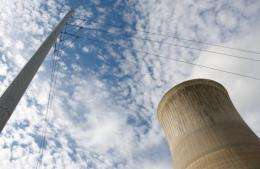US sets new carbon standard for power plants

The United States said Tuesday it was setting the first national standards on carbon emissions from power plants, taking aim at the burning of coal which is considered a top culprit in climate change.
After more than a year of deliberations on the politically charged proposal, the Environmental Protection Agency said it would only apply the rules to future sites and will still allow coal-fired plants if they are upgraded.
"Right now there are no limits to the amount of carbon pollution that future power plants will be able to put into our skies -- and the health and economic threats of a changing climate continue to grow," the agency's chief, Lisa Jackson, said in a statement.
"We're putting in place a standard that relies on the use of clean, American-made technology to tackle a challenge that we can't leave to our kids and grandkids," she said.
The statement did not go into detail on the new standards, but the agency was to hold a press briefing later Tuesday. It insisted that the rules would not impose additional costs as the industry is already moving in line with the standards.
US fossil fuel power plants and petroleum refineries are estimated to emit nearly 40 percent of the country's carbon emissions, which scientists blame for the planet's rising temperatures and increasingly severe weather.
President Barack Obama's administration has vowed to reduce US carbon emissions, but its efforts face strong opposition from industry and the rival Republican Party, many of whose members question the science behind climate change.
Proposals by Obama's allies to set up a nationwide system to curb carbon emissions have died in Congress. UN-led negotiations on a new climate treaty have also made little concrete progress, with China and other major emerging economies urging the United States to make a greater commitment.
Republicans have been sharply critical of the EPA since it first announced in December 2010 that it would move to regulate power plants, with some lawmakers seeking ways to strip its authority.
The Supreme Court ruled in 2007 that the agency holds the authority to regulate carbon dioxide and other greenhouse gases under existing legislation.
(c) 2012 AFP


















